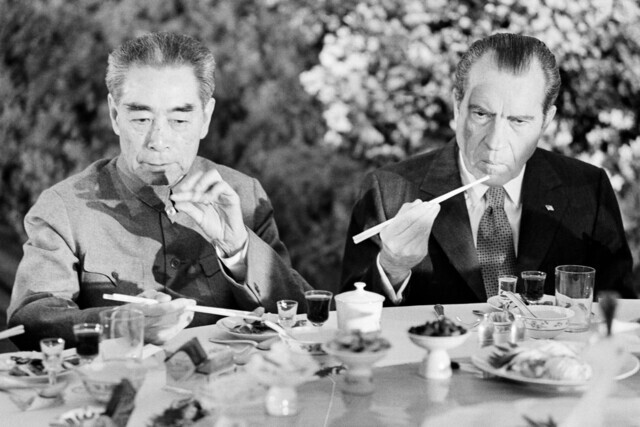hankyoreh
Links to other country sites 다른 나라 사이트 링크
50 years after Nixon’s trip to China, Beijing sanctions 2 US weapons companies

On the 50th anniversary of a historic China visit by then-US President Richard Nixon that laid the cornerstone for diplomatic ties between the two countries, Beijing announced plans to sanction US defense companies for exporting weapons to Taiwan.
Some analysts are calling the measures a symbolic illustration of how much US-China relations have changed in the last half-century.
According to reports Tuesday by China’s state-run Xinhua News Agency and other media, Chinese Foreign Ministry spokesperson Wang Wenbin announced at a regular briefing Monday that China was imposing sanctions on the major US defense companies Raytheon Technologies Corp. and Lockheed Martin Corp. based on its Anti-Foreign Sanctions Law, which went into effect last year.
The US Defense Department previously informed Congress that it had approved a US$100 million contract between the two companies and Taiwan for missile defense system maintenance and repairs.
The Anti-Foreign Sanctions Law was passed in June 2021 by the National People’s Congress Standing Committee, China’s highest legislative body. Its Article 3 states that the Chinese government “has the right to employ retaliatory measures when foreign governments adopt discriminatory restrictions on China’s citizens and organizations or interfere with its internal affairs.”
“China once again urges the US government and relevant sides to abide by the one-China principle and the stipulations of the three China-US joint communiques, and stop arms sales to and military ties with Taiwan,” Wang said, adding that Beijing planned to “continue to take all necessary measures to resolutely uphold its sovereignty and security interests in light of the situation’s development.” He did not provide specifics on the nature of the sanctions.
China announced the sanctions on Monday, which happened to also be the 50th anniversary of the 1972 visit to China by Nixon, who referred to it as the “week that changed the world.” After meeting with China’s then-leader Mao Zedong and Premier Zhou Enlai, Nixon reached an agreement on principles for improving the two sides’ relationship in the “Shanghai Communique,” which was concluded on Feb. 28 of the same month ahead of his return to the US.
In the process, the US recognized that “all Chinese on either side of the Taiwan Strait maintain there is but one China and that Taiwan is a part of China.” It further called for the “peaceful settlement of the Taiwan question” and affirmed the “ultimate objective of the withdrawal of all US forces and military installations from Taiwan.”
Indeed, the US later ended its mutual defense treaty with Taiwan and withdrew its troops when it established diplomatic ties with Beijing on Jan. 1, 1979.
Since the Nixon administration, US policies on China have been rooted in the belief that China can be “changed” through economic, diplomatic and cultural ties.
But in the wake of China’s growth, it began posing challenges to the US’ “postwar order” in the 2010s, prompting skeptics in the US to call the past engagement policies a failure.
China’s state-run Global Times quoted an unnamed expert as noting that “the US has greatly benefited from the normalization of China-US ties and emerged victorious in the Cold War,” while also noting normalization of relations opened “a huge market for US companies to earn huge profits.”
“Although China sincerely wants to repair ties with the US and continue making efforts to bring bilateral ties back on track, it's impossible for China to abandon its principles, core interests and development rights just to maintain 'good' ties with the US,” another expert was quoted as saying.
By Jung In-hwan, Beijing correspondent
Please direct questions or comments to [english@hani.co.kr]

Editorial・opinion
![[Guest essay] The real reason Korea’s new right wants to dub Rhee a founding father [Guest essay] The real reason Korea’s new right wants to dub Rhee a founding father](https://flexible.img.hani.co.kr/flexible/normal/500/300/imgdb/original/2024/0423/8317138574257878.jpg) [Guest essay] The real reason Korea’s new right wants to dub Rhee a founding father
[Guest essay] The real reason Korea’s new right wants to dub Rhee a founding father![[Column] ‘Choson’: Is it time we start referring to N. Korea in its own terms? [Column] ‘Choson’: Is it time we start referring to N. Korea in its own terms?](https://flexible.img.hani.co.kr/flexible/normal/500/300/imgdb/original/2024/0423/3617138579390322.jpg) [Column] ‘Choson’: Is it time we start referring to N. Korea in its own terms?
[Column] ‘Choson’: Is it time we start referring to N. Korea in its own terms?- [Editorial] Japan’s rewriting of history with Korea has gone too far
- [Column] The president’s questionable capacity for dialogue
- [Column] Are chaebol firms just pizza pies for families to divvy up as they please?
- [Column] Has Korea, too, crossed the Rubicon on China?
- [Correspondent’s column] In Japan’s alliance with US, echoes of its past alliances with UK
- [Editorial] Does Yoon think the Korean public is wrong?
- [Editorial] As it bolsters its alliance with US, Japan must be accountable for past
- [Guest essay] Amending the Constitution is Yoon’s key to leaving office in public’s good graces
Most viewed articles
- 1Samsung barricades office as unionized workers strike for better conditions
- 2[Editorial] Japan’s rewriting of history with Korea has gone too far
- 3[Column] The president’s questionable capacity for dialogue
- 4[Reporter’s notebook] Did playing favorites with US, Japan fail to earn Yoon a G7 summit invite?
- 5[Column] The clock is ticking for Korea’s first lady
- 6Korean government’s compromise plan for medical reform swiftly rejected by doctors
- 7[Column] Are chaebol firms just pizza pies for families to divvy up as they please?
- 8Why Korea shouldn’t welcome Japan’s newly beefed up defense cooperation with US
- 9[Column] Has Korea, too, crossed the Rubicon on China?
- 10US overtakes China as Korea’s top export market, prompting trade sanction jitters